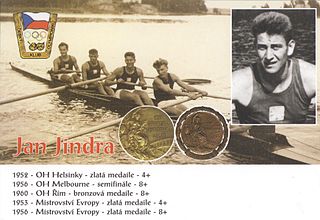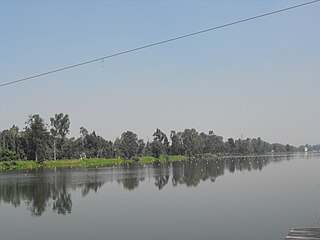Related Research Articles
Charlotte Mosher "Carlie" Geer is a rower from the United States.
The 1962 World Rowing Championships were the inaugural world championships in rowing. The competition was held in September 1962 on the Rotsee in Lucerne, Switzerland. Rowers from West Germany dominated the competition, winning five of the seven boat classes.

The men's coxed four event was part of the rowing programme at the 1924 Summer Olympics. The competition, the fourth appearance of the event, was held from 13 to 17 July 1924 on the river Seine. There were 10 boats from 10 nations, with each nation limited to a single boat in the event. The event was won by Switzerland, the nation's second consecutive victory in the event; the two Swiss victories matched Germany for most among nations to that point. France earned its first medal in the event since 1900 with silver. The United States reached the podium for the second straight Games with a bronze medal. Hans Walter, a member of the Swiss crew in 1920 as well as this year, was the first man to win two medals in the event, and the only one to win two golds.
Alan John Webster is a former New Zealand rower.
Hannah Dreissigacker is a former American biathlete. She competed at the 2014 Winter Olympics in Sochi.
Toni James Dunlop is a New Zealand rower and has represented New Zealand three times at the Olympics.
David Siegmund Schaper is a New Zealand rower.

The men's coxed four competition at the 1956 Summer Olympics took place at Lake Wendouree, Ballarat, Australia. It was held from 23 to 27 November and was won by the team from Italy. There were 10 boats from 10 nations, with each nation limited to a single boat in the event. Italy had previously won this event in 1928, tying Switzerland for second-most wins among nations. Sweden (silver) and Finland (bronze) each won their first medal in the men's coxed four. Switzerland had its three-Games silver-medal streak broken, without a Swiss crew competing.

The men's coxed four (M4+) competition at the 1984 Summer Olympics took place at Lake Casitas in Ventura County, California, United States. There were 8 boats from 8 nations, with each nation limited to a single boat in the event. It was held from 30 July to 5 August and the dominant nations were missing from the event due to the Eastern Bloc boycott. Great Britain dominated the regatta, winning the nation's first rowing gold since the 1948 Summer Olympics, back then in front of their home crowd at the Henley Royal Regatta course. The 1984 event started Steve Redgrave's Olympic rowing success that would eventually see him win five Olympic gold medals. It was Great Britain's first victory in the men's coxed four and first medal of any colour in the event since 1912. The other medaling nations had also not been to the podium in the coxed four recently; the United States took silver, that nation's first medal in the event since 1952, while New Zealand's bronze was its first medal since 1968.

The men's coxed four competition at the 1952 Summer Olympics took place at Mei Bay, Helsinki, Finland. It was held from 20 to 23 August and was won by the team from Czechoslovakia. There were 17 boats from 17 nations, with each nation limited to a single boat in the event. The gold medal was Czechoslovakia's first medal in the men's coxed four. Switzerland earned its third consecutive silver medal, and sixth medal in seven Games dating back to 1920. The reigning champion United States took bronze.

The men's eight competition at the 1968 Summer Olympics took place at Virgilio Uribe Rowing and Canoeing Course, Mexico City, Mexico. It was held from 13 to 19 October and was won by the team from West Germany, with the teams from Australia and the Soviet Union claiming silver and bronze respectively. It was West Germany's first appearance as a separate nation, though the United Team of Germany had won gold in 1960 and silver in 1964, with West Germans making up those teams. The silver medal was Australia's best result yet in the event; the nation had previously taken bronze in 1952 and 1956. The Soviet Union reached the podium in the men's eight for the first time since earning silver in 1952. Twelve teams from 12 nations attended the competition. Five of the teams replaced a total of five rowers during the competition, making for a total of 113 rowers who participated in the races.
The women's single sculls (W1x) rowing competition at the 1984 Summer Olympics took place at Lake Casitas in Ventura County, California, United States. It was held from 30 July to 4 August.

The men's eight (M8+) competition at the 1984 Summer Olympics took place at Lake Casitas in Ventura County, California, United States. It was held from 31 July to 5 August. There were 7 boats from 7 nations, with each nation limited to a single boat in the event. New Zealand had won the last two world championships, and the other strong team, East Germany, was absent from the event due to the Eastern Bloc boycott. This made New Zealand the strong favourite. But the final was won by Canada, with the United States and Australia the other medallists, and New Zealand coming a disappointing fourth.
Antal Szebeny was a Hungarian rower. He competed at the 1908 Summer Olympics and the 1912 Summer Olympics. Three younger brothers, Miklós, György and István, were also Olympic rowers.
Miklós Szebeny was a Hungarian rower. He competed in the men's eight event at the 1912 Summer Olympics. Three brothers, Antal, György and István, were also Olympic rowers; György was his twin.
György Szebeny was a Hungarian rower. He competed in the men's eight event at the 1912 Summer Olympics. Three brothers, Antal, Miklós and István, were also Olympic rowers; Miklós was his twin.
Judy Geer is an American rower. She competed at the 1976 Summer Olympics and the 1984 Summer Olympics.
Mimi Kellogg is an American rower. Kellogg attended Princeton University and was co-captain of the women's rowing team. She graduated from Princeton with a degree in aeronautical engineering in 1976. She later graduated from Massachusetts Institute of Technology with a master's degree in aerospace engineering in 1978. She competed in the debut women's coxed four event at the 1976 Summer Olympics, in which her crew placed 6th.

The Rüsselsheimer Ruder-Klub 08, also known by its abbreviation RRK 08, is a sports club based in the German city of Rüsselsheim am Main. Originally a rowing club, the main sport has been hockey since the late 1960s. The other sport offered is tennis.
References
- ↑ Evans, Hilary; Gjerde, Arild; Heijmans, Jeroen; Mallon, Bill; et al. "Dick Dreissigacker". Olympics at Sports-Reference.com. Sports Reference LLC. Archived from the original on April 18, 2020. Retrieved August 9, 2014.
- 1 2 "The Erg to Compete: Peter and Dick Dreissigacker, who wanted to row all winter, invented a machine that goes nowhere fast". Stanford University Alumni Magazine. January 2007.
- ↑ Evans, Hilary; Gjerde, Arild; Heijmans, Jeroen; Mallon, Bill; et al. "Judy Geer". Olympics at Sports-Reference.com. Sports Reference LLC. Archived from the original on April 18, 2020. Retrieved August 9, 2014.
- ↑ Evans, Hilary; Gjerde, Arild; Heijmans, Jeroen; Mallon, Bill; et al. "Carlie Geer". Olympics at Sports-Reference.com. Sports Reference LLC. Archived from the original on April 18, 2020. Retrieved August 9, 2014.
- ↑ Evans, Hilary; Gjerde, Arild; Heijmans, Jeroen; Mallon, Bill; et al. "Hannah Dreissigacker". Olympics at Sports-Reference.com. Sports Reference LLC. Archived from the original on April 18, 2020. Retrieved August 9, 2014.
- ↑ Williams, Doug (January 22, 2014). "In Olympic Family, Hannah Dreissigacker Takes Her Own Course". TeamUSA.org. Archived from the original on January 25, 2014.
- ↑ Gardiner, Andy (February 12, 2018). "Vermont Olympian Emily Dreissigacker: 'More About The Process, Less About The Result'". Vermont Public Radio . Retrieved February 26, 2018.